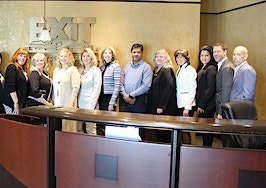Brian Copeland has made a name for himself as a thought leader in the real estate industry. He’s helped handle a realtor.com conference, spoken at Inman Connect and served as the president of the Tennessee Association of Realtors.
And when he becomes vice president of association affairs at the National Association of Realtors next year, he’s unlikely to find himself with additional free time. “I speak, it seems, like every two weeks somewhere,” he said.
But that hasn’t stopped Copeland from launching a virtual brokerage, a model gaining traction amid eXp Realty’s rapid growth. Nashville, Tenn.-based Doorbell will give agents a long leash — along with tech tools and support.
“I don’t want to use the word ‘virtual brokerage,” he told Inman last week on the eve of the brokerage’s beta launch, noting that the term sometimes carries a negative connotation. “That’s why I use the word ‘flexible.”
But what could distinguish the brokerage is its fee structure, which requires agents to pay a fee just once or twice a year. Despite being in its early stages, Copeland has begun interviewing agents for its Nashville operation and soliciting interest in a bid to expand into other markets.
Agents will pay Doorbell a single annual or biannual fee that will substitute not only for commission splits and transaction fees, but also cover standard business fees like local, state and national Realtor association dues, errors and omissions insurance, MLS fees and lockbox access.
Copeland wouldn’t disclose the size of the fee, but said it should offer agents more convenience, provide “the flexibility to make the money you want to make” and eliminates the risk that agents will incur late fees.
“Flexibility” is an overriding theme of the brokerage’s value proposition to potential recruits. Doorbell “is the most flexible brokerage you’ll find anywhere,” its website says.
One element of that flexibility: without an office paid for by the brokerage, agents may choose to pay for their own office — or not, Copeland said. Doorbell will recommend joining a co-working space should they choose to pay for an office.
Copeland said the brokerage also offers agents free rein to market their brand and listings as they see fit, provided they comply with state regulations, such as a Tennessee law that requires a brokerage’s branding to appear more prominently on signs than an agent’s.

Brian Copeland
As Doorbell agents squat in coffee shops, banter with startup founders at a local WeWork or work from home, they’ll have free access to an integrated system of business software, including a transaction management system powered by SkySlope and print and online marketing tools.
Doorbell agents will also be able to outsource lead-generation and prospecting tasks. The firm offers a free appointment-setting service and will distribute free qualified leads referred by online lender Better Mortgage, though agents won’t be guaranteed a minimum number of leads.
Doorbell’s network doesn’t include customer relationship management software, but Copeland advises Doorbell agents to pay for Contactually.
Despite no readily available offices, Copeland said the company will strive to foster strong community among the agents. The brokerage will use social media groups, weekly video conferences and periodic in-person seminars to build connections among Doorbell agents, he said.
“I’ve learned so much about community building online,” he said.
Copeland said it will start by hiring agents for its Nashville operation and then mull various ways to branch out. Benefiting from his vast network of industry connections, Copeland says his email inbox has recently been flooded with inquiries about Doorbell.
The unanswered question, he said, is, “Can a homegrown one-person brokerage make it off the ground without venture capital?”













